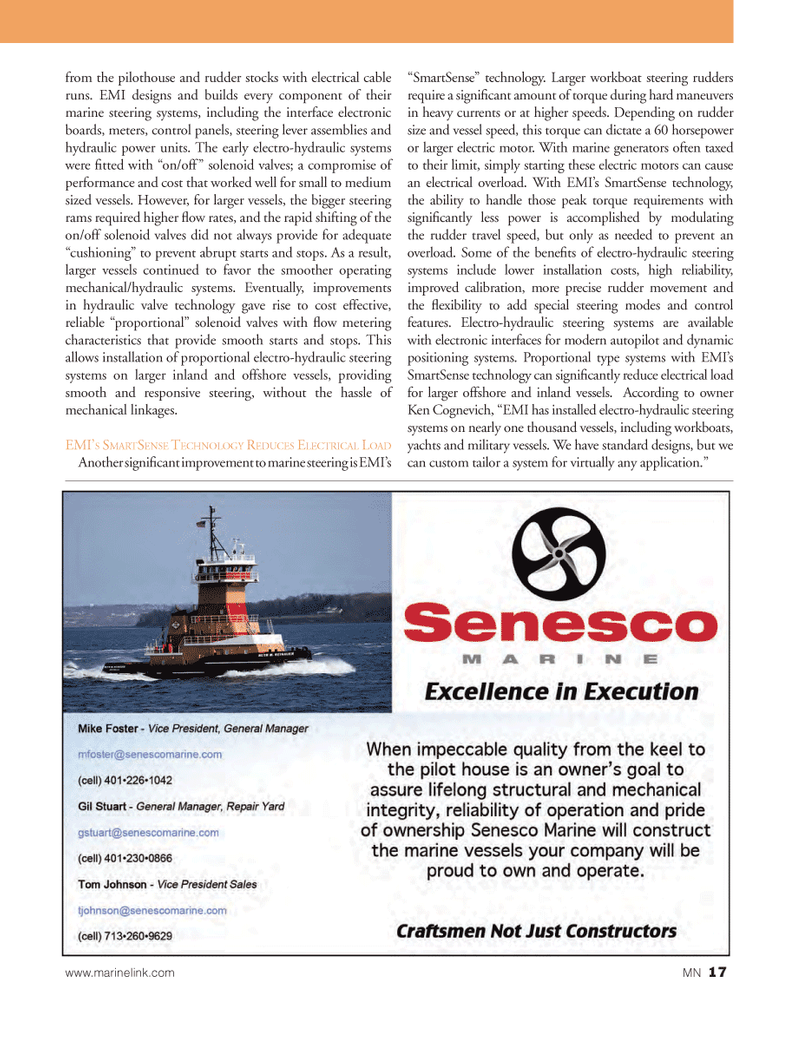
Page 17: of Marine News Magazine (September 2012)
Environment: Stewardship & Compliance
Read this page in Pdf, Flash or Html5 edition of September 2012 Marine News Magazine
from the pilothouse and rudder stocks with electrical cable runs. EMI designs and builds every component of their marine steering systems, including the interface electronic boards, meters, control panels, steering lever assemblies and hydraulic power units. The early electro-hydraulic systems were Þ tted with Òon/offÓ solenoid valves; a compromise of performance and cost that worked well for small to medium sized vessels. However, for larger vessels, the bigger steering rams required higher ß ow rates, and the rapid shifting of the on/off solenoid valves did not always provide for adequate ÒcushioningÓ to prevent abrupt starts and stops. As a result, larger vessels continued to favor the smoother operating mechanical/hydraulic systems. Eventually, improvements in hydraulic valve technology gave rise to cost effective, reliable ÒproportionalÓ solenoid valves with ß ow metering characteristics that provide smooth starts and stops. This allows installation of proportional electro-hydraulic steering systems on larger inland and offshore vessels, providing smooth and responsive steering, without the hassle of mechanical linkages.EMIÕS SMART SENSE TECHNOLOGY REDUCES ELECTRICAL LOAD Another signiÞ cant improvement to marine steering is EMIÕs ÒSmartSenseÓ technology. Larger workboat steering rudders require a signiÞ cant amount of torque during hard maneuvers in heavy currents or at higher speeds. Depending on rudder size and vessel speed, this torque can dictate a 60 horsepower or larger electric motor. With marine generators often taxed to their limit, simply starting these electric motors can cause an electrical overload. With EMIÕs SmartSense technology, the ability to handle those peak torque requirements with signiÞ cantly less power is accomplished by modulating the rudder travel speed, but only as needed to prevent an overload. Some of the beneÞ ts of electro-hydraulic steering systems include lower installation costs, high reliability, improved calibration, more precise rudder movement and the ß exibility to add special steering modes and control features. Electro-hydraulic steering systems are available with electronic interfaces for modern autopilot and dynamic positioning systems. Proportional type systems with EMIÕs SmartSense technology can signiÞ cantly reduce electrical load for larger offshore and inland vessels. According to owner Ken Cognevich, ÒEMI has installed electro-hydraulic steering systems on nearly one thousand vessels, including workboats, yachts and military vessels. We have standard designs, but we can custom tailor a system for virtually any application.Ó www.marinelink.com MN 17MNSept2012 Layout 1-17.indd 17MNSept2012 Layout 1-17.indd 178/30/2012 2:47:28 PM8/30/2012 2:47:28 PM

 16
16

 18
18
